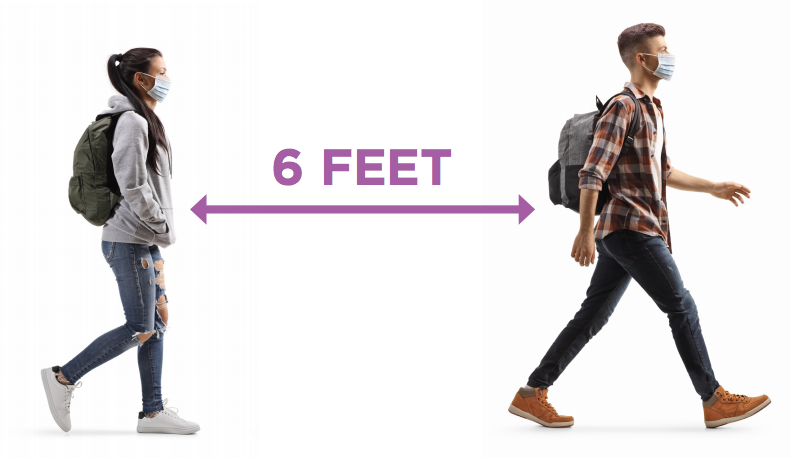Gov. Roy Cooper released new health guidance for North Carolina’s K-12 public schools during a June 8 press conference, created in collaboration with NCDHHS, the Department of Public Instruction and stakeholders across the state. The guidelines ask local education leaders to plan for reopening schools under three scenarios: minimal social distancing if COVID-19 metrics stabilize or improve; moderate social distancing if state metrics worsen; and remote learning only if state metrics “worsen significantly.” Schools should be prepared to move between these three scenarios as needed, Cooper warned.
The guidance includes several core requirements, including screening all students and staff for COVID-19 symptoms, marking 6-foot spacing to remind students of social distance and strict cleaning regimens. Recommendations such as keeping windows open on school busses, avoiding the sharing of items that can’t be easily disinfected and creating one-way hallways are up to individual schools to implement if feasible.
“There is no replacement for the time spent in the classroom,” said Mark Johnson, the state’s superintendent of public instruction, during a June 8 press conference. “But just know we are balancing the need to get back in the classroom while knowing COVID-19 is still out there.”
A final decision on public school reopening will be announced by Wednesday, July 1, Cooper said.
North Carolina COVID-19 metrics accelerate in wrong direction
North Carolina is attracting national attention for its COVID-19 metrics — and not in a good way. During a June 8 press conference, Dr. Mandy Cohen, the state’s secretary of health and human services, said she had been contacted on June 5 by Dr. Deborah Birx, response coordinator for the White House Coronavirus Task Force, to discuss national concerns over the state’s worrying viral trends.
On June 6, North Carolina recorded its highest daily increase of COVID-19 cases to date at 1,370. A day before, on June 5, the state passed 1,000 COVID-19 deaths, including the first fatality in a child. And 739 patients, the highest number yet, are currently hospitalized with the disease, with 77% of the state’s hospitals reporting.
The rise in cases and hospitalizations is in part linked to increased testing, Cohen explained. But the percentage of positive tests, a metric that takes increased testing into account, has reached 10% — one of the highest levels in the country, Cooper said.
Viral spread remains prevalent in the community, Cohen continued, and the jump in cases comes roughly two weeks after the state moved into Phase 2 of Cooper’s three-phase reopening plan, which included restaurants, salons, breweries and community swimming pools at limited capacity. The incubation period of COVID-19 is approximately two weeks, Cohen said.
State recommends all mass gathering attendees get COVID-19 tests
It’s too soon to tell if North Carolina’s spike in cases is also related to the recent wave of protests and demonstrations in response to the police killing of George Floyd. But health officials are encouraging anyone who has attended a mass gathering to get tested for COVID-19 approximately six days after potential exposure or as soon as they start showing symptoms, explained Dr. Zack Moore, a state epidemiologist with the NC Division of Public Health, during a June 8 briefing.
Contact tracers are actively working to inform anyone who has been in close contact with a COVID-19 patient or who is at risk for potential exposure about isolation measures, Moore continued. If a known positive case attended a protest, local health departments will work to inform the community about the exposure through press releases, social media and local media outlets, he said.
Dr. Jennifer Mullendore, Buncombe County’s interim health director, urged all residents to take contact tracing seriously during a local press conference on June 8. She noted that contact tracers have struggled to reach individuals who won’t answer a call from an unknown number; she emphasized that all information shared with contact tracers would remain confidential.
According to the NCDHHS, those contacted by the state’s tracers will receive an initial text from the number 45394 or an email from NC-ARIAS-NoReply@dhhs.nc.gov. Follow-up calls will come from local health departments or NC OUTREACH (844-628-7223).
In other news
- Buncombe County and Western North Carolina Community Health Services continue to offer free community-based COVID-19 testing. Testing will be able at the Shiloh Community Friendship Center on Tuesday, June 9, from 1-4 p.m.; the former location of Frugal Backpacker and Carolina Furniture Concepts on Hendersonville Road in South Buncombe on Wednesday, June 10, from 1-4 p.m.; and the Buncombe County Sports Park in Enka on Thursday, June 11, from 1-4 p.m. Language translation services will be available at all locations.
- The Better Business Bureau of Southern Piedmont and Western North Carolina is warning against contact tracing scams. If an alleged contact tracer asks for personally identifying information, including Social Security numbers or financial details, hang up immediately.
- The city of Hendersonville will hold a document shred and drug take-back event on Friday, June 12, from 9-10:30 a.m. The drive-thru event will be held in the Dogwood Parking Lot at 423 Church St., and participants are asked to bring a canned food donation for the Interfaith Assistance Ministry.




Before you comment
The comments section is here to provide a platform for civil dialogue on the issues we face together as a local community. Xpress is committed to offering this platform for all voices, but when the tone of the discussion gets nasty or strays off topic, we believe many people choose not to participate. Xpress editors are determined to moderate comments to ensure a constructive interchange is maintained. All comments judged not to be in keeping with the spirit of civil discourse will be removed and repeat violators will be banned. See here for our terms of service. Thank you for being part of this effort to promote respectful discussion.